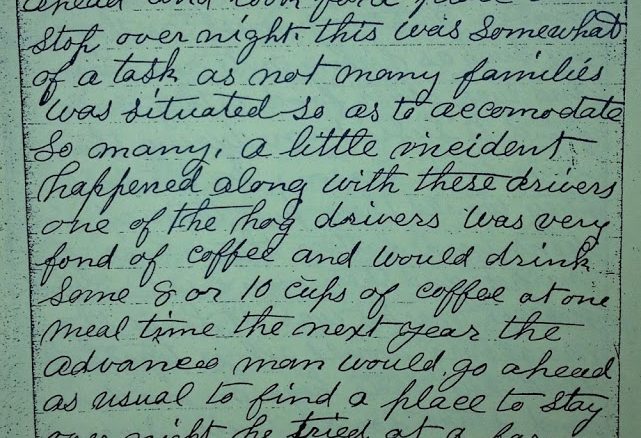More “Incidents” As Told by William Edward Peabody
My great grandfather William Edward Peabody was born in Stonington, IL in 1846. His father William Starr Peabody was one of the colony’s main founders. The following is excerpts from his remembrances about Old Stonington Colony around experiences that became stories told over and over, stories they referred to as “incidents” and which reveal a great deal about the little everyday events that gave the settlers pleasure, pain, and from which they derived meaning.
Incident: My Uncle Rev. Paris Pray preached to the church a number of years, and his salary was to be $50 per year, but some years he did not receive all of his salary and he had to go out and do farm work for the neighbors. A little incident happened one time in one of these meetings, on Sunday morning, there were two men by the name of John Brown, one was a Deacon and the other did not belong to any church. He was a day laborer and was known as Brown, the Shingle Maker, and one of the members was called upon to lead in prayer. He was making a splendid prayer, but was quite interested in the Brown that was not a Christian, so in his prayer he prayed for the salvation of John Brown, not thinking of the other Brown, he seemed to think that the members might think what was wrong, with Deacon Brown, and coming to himself he says in his prayer, “I mean John Brown, the Shingle Maker.”
Incident: Thomas Chapman [one of original founders and William’s uncle] was sometimes a little absent minded, he was a great man to walk, when going to neighbors or Church, so one Sunday he road a horse to Church and when the Church was over members came out and Brother Chapman was very much interested in some of the men, as they were going his way, he walked with them. He lived a little over a mile from where they held services , and as he reached home his wife says, “Why Mr. Chapman, where is your horse?” He says, “Pox! take it,” which was his byword, “ I have left it hitched down to the schoolhouse.” So he had to walk back to get his horse.
Incident: In the early days they had but few fences, and often when the stock was out at large they sometimes would get into crops. Thomas Chapman had a small patch of corn and Deacon Peabody’s hogs got into his patch a few times, which made Brother Chapman out of humor. He said to his wife, “Martha, go in the house. I want to swear.” She says, “No, Mr. Chapman, you must not swear, I will damn Deacon Peabody’s hogs.”
In those days the cattle were turned loose “upon the vast prairies to get their own living after April 1” and the hogs would forage in the prairies and forest, gathering “mast” such as hickory nuts and acorns during the summer months. In the fall they would put the hogs in pens, fatten them up, and then the neighbors would go together and drive all their hogs to St. Louis, several days to the south. One man on horseback would ride ahead and look for a place to stop for the night. Not many families were “situated so as to accommodate so many.”
Incident: A little incident happened along with these drivers. One of the hog drivers was very fond of coffee and would drink some eight or ten cups of coffee at one meal. The next year the advance man would go ahead as usual to find a place to spend the night. He tried at a farmhouse where they had stopped the year before and asked if they could stay that night, as they had a large bunch of hogs. The lady of the house asked if they had the big coffee drinker with them. If they did, she did not have coffee enough in the house. So he assured her that the coffee drinker was not with them this time.
